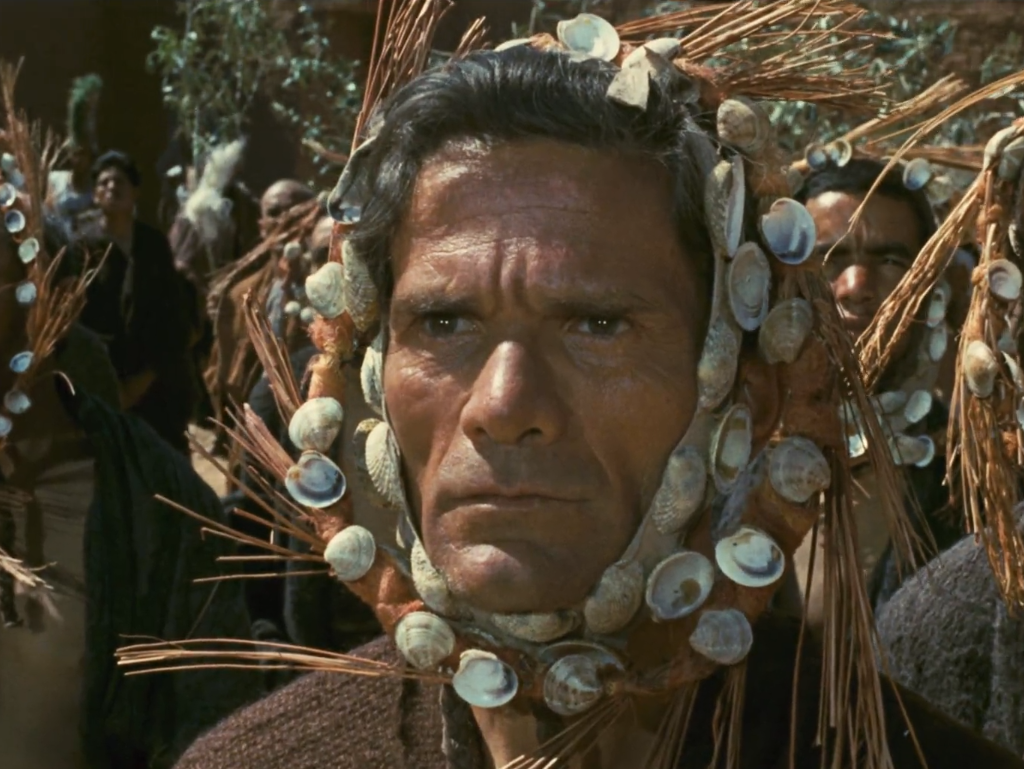
Rescued from abandonment and raised by the King and Queen, Oedipus is still haunted by a prophecy – he'll murder his father and marry his mother.
EN
Louis Valentin: Do you love life?
Pier Paolo Pasolini: I love it fiercely, even desperately. I believe that this ferocity and this desperation will only lead to my destruction. I love the sun, the grass, youth. It has become for me a vice more terrible than cocaine. I devour my existence with an insatiable appetite. How will all of this end? I don’t know….
Why are your films so scandalous?
Because I am scandalous, as I explained before. I am scandalous because I have a cord, an umbilical cord, between the profane and the sacred.
Pier Paolo Pasolini in conversation with Louis Valentin1
“Edipo re is perhaps Pasolini’s most realistic film in that it talks about what he regarded as his own deepest reality. I would like to stress ‘he regarded,’ however, because homosexuality, in and of itself, is not necessarily the deepest layer in one’s psychic formation. Pasolini’s adherence to Freudianism, together with the external imposition of invisibility, however, sitated his homosexual discourse behind the scenes. ‘There is an abyss within you.’ The Sphinx’s remark suggests that Oedipus/Pasolini lived his life by the metaphor of depth, in which things are hidden and from which they must arise. I am reminded of Murnau’s superb metaphor of homosexuality as Nosferatu, the vampire. It is only by making love to your vampire in the daylight that you can get rid of him. Otherwise, what is repressed returns. And the more you deny it, the more it will come back and bite you.”
Maurizio Viano2
Oswald Stack: There are two initial questions I'd like to ask you about Oedipus.The first is about Sophocles’ text.This is the only case apart from The Gospel where you could be said to be working with someone else’s script- did you keep to it verbally (because you obviously didn't structurally) as close as you did to Matthew’s text? The second is about your interpretation of the Oedipus myth, which is a basically anti-Freudian one; you’ve given a lot more emphasis to the parricide than to theincest. The myth is an amalgam anyway, so it's an interesting approach because the two things are fairly separate.
Pier Paolo Pasolini: I'm not very well prepared to answer this, because I've really never thought about it. I think the two things are complementary - incest is not possible with the mother unless there's parricide as well. If I remember right,the two have an equal importance in Sophocles’ text. You've just pointed out that in my film the parricide comes out more than the incest, certainly emotively if not quantitatively, but I think this is fairly natural because historically I have put myself in a relationship of rivalry and hatred towards my father, so I am freer in the way I represent my relationship towards him, whereas my love for my mother has remained something latent.Even if I understand it rationally, it is difficult to accept it in all its fullness. Perhaps I was inhibited in representing it artistically while I let myself go in the way I represented the parricide. This must be due quite simply to Freudian reasons, presumably. I hadn't realized it before; but you're right.
Oswald Stack in conversation with Pier Paolo Pasolini3
- 1“Pier Paolo Pasolini interviewed by Louis Valentin (1970),” libcom.org, 19 November 2018. Originally published in Lui, No. 1, June 1970.
- 2Maurizio Viano, A Certain Realism: Making Use of Pasolini's Film Theory and Practice (Berkeley: University of California Press, 1993), 182.
- 3Oswald Stack, Pasolini (Bloomington: Indiane University Press, 1969).

